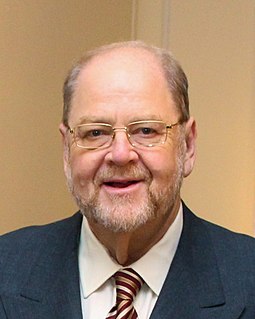A Quote by Barry Barish
Anything that makes us take more seriously scientists - or economists or chemists or physicists or biologists - I think is helpful in times when things get distorted because of people not paying attention to all the facts.
Related Quotes
We live in a highly industrialized society and every member of the Black nation must be as academically and technologically developed as possible. To wage a revolution, we need competent teachers, doctors, nurses, electronics experts, chemists, biologists, physicists, political scientists, and so on and so forth. Black women sitting at home reading bedtime stories to their children are just not going to make it.
As physics students, we are taught that physicists are smart, that chemists are moderately acceptable, and that biologists are certainly not very intelligent. So I wasn't inclined to take a biology course. But my father insisted, and maybe what he had in mind was that, if there were no jobs in physics, I would end up being a doctor.
Physicists only talk to physicists, economists to economists-worse still, nuclear physicists only talk to nuclear physicists and econometricians to econometricians. One wonders sometimes if science will not grind to a stop in an assemblage of walled-in hermits, each mumbling to himself words in a private language that only he can understand.
Economists and workplace consultants regard it as almost unquestioned dogma that people are motivated by rewards, so they don't feel the need to test this. It has the status more of religious truth than scientific hypothesis. The facts are absolutely clear. There is no question that in virtually all circumstances in which people are doing things in order to get rewards, extrinsic tangible rewards undermine intrinsic motivation.The bonus myth: How paying for results can backfire The world is a dangerous place, not because of those who do evil, but because of those who look on and do nothing.
The unhappy person resents it when you try to cheer him up, because that means he has to stop dwelling on himself and start paying attention to the universe. Unhappiness is the ultimate form of self-indulgence. When you're unhappy, you get to pay a lot of attention to yourself. You get to take yourself oh so very seriously.
When chemists have brought their knowledge out of their special laboratories into the laboratory of the world, where chemical combinations are and have been through all time going on in such vast proportions,-when physicists study the laws of moisture, of clouds and storms, in past periods as well as in the present,-when, in short, geologists and zoologists are chemists and physicists, and vice versa,-then we shall learn more of the changes the world has undergone than is possible now that they are separately studied.
If you look at the last 150 years, about every 30 years or so, a new scientific discipline emerges that starts spinning out technologies and capturing people's imaginations. Go back to 1900: That industry was chemistry. People had chemistry sets. In the 1930s, it was the rise of physics and physicists. They build on each other. Chemists laid the experimental understanding for the physicists to build their theories. It was three physicists who invented the transistor in 1947. That started the information revolution. Today, kids get computers.
I think TV companies don't take as many risks any more, it's a bit more prescriptive. There are more channels but there seems to be actually less main network channel comedy. You can't offend people as easily, people take things very seriously now. I think that's down to social media though because people can have little tribes of offence.
I assume the same problem exists in Australia as in America of back-biting and jealousy and parochialism among disciplines - there are the scientists, and there are the humanities people, and there are chemists and the physicists and everybody snipes at everybody else and inter-disciplinary communication is rare. But it's very precious and necessary.


































